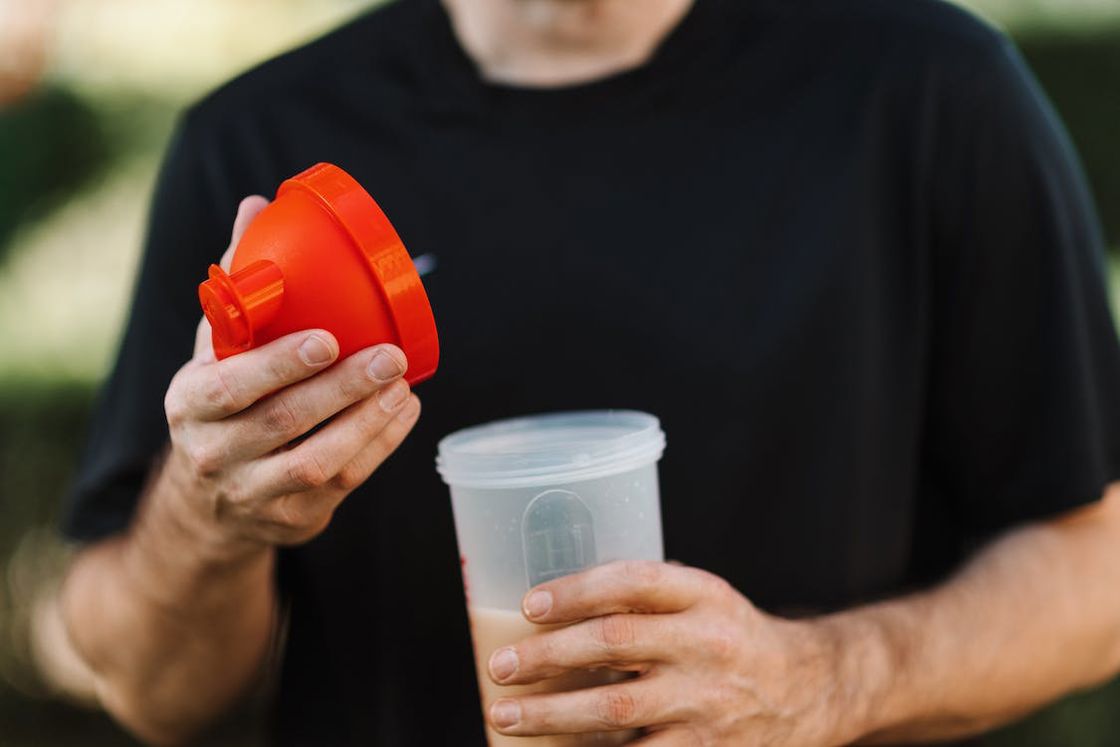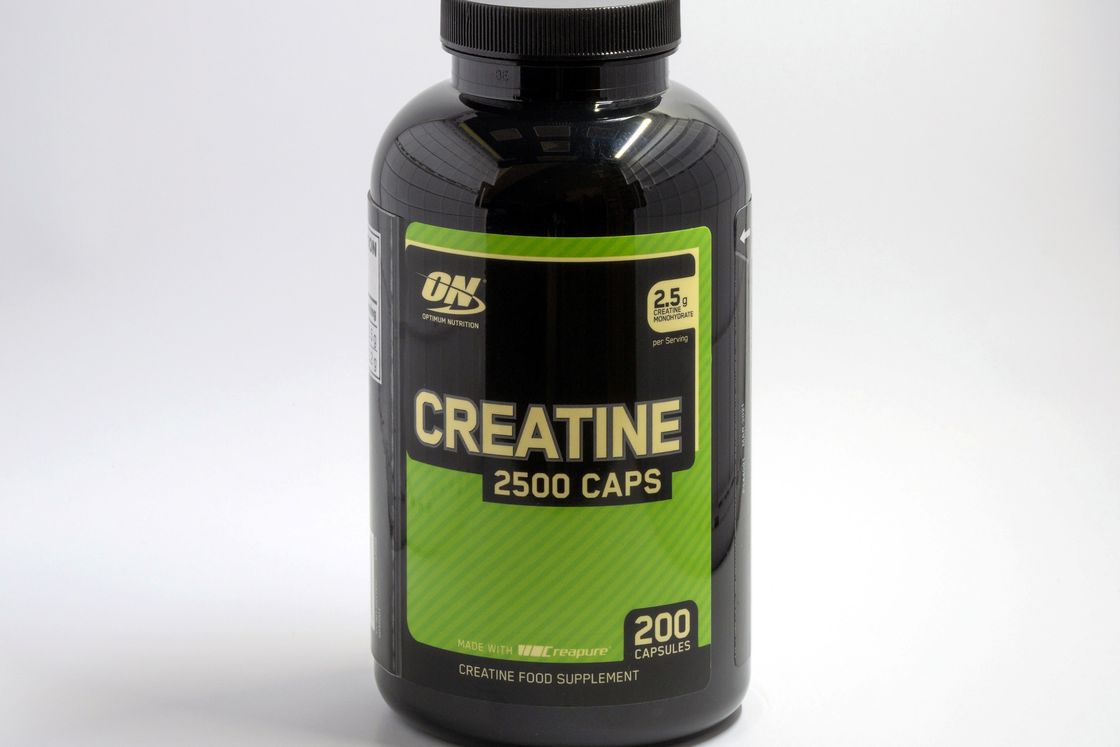Creatine is an effective ergogenic nutritional supplement that helps to increase muscle growth and workout performance. After protein, it is the most popular supplement in the strength training and bodybuilding communities. However, if you’re new to supplements you are likely wondering if beginners should take creatine. If you recently started working out, you should learn about this subject so you can maximize your gains.
Should Beginners Take Creatine?
Yes, beginners will benefit from creatine’s muscle-building properties. After all, this dietary supplement can boost muscle mass, strength, and exercise performance making it one of the best supplements for strength training. It also has other health benefits, such as improving brain function and reducing fatigue.
This is because the body uses creatine to produce adenosine triphosphate (ATP), which provides energy to the muscles during exercise. Therefore, creatine increases the energy available to muscles during high-intensity exercise, allowing athletes to complete more reps.

What Results Can You Expect When You Start Taking Creatine?
As a newbie, using creatine can help you gain lean body mass and strength. It can also boost your athletic performance, particularly during high-intensity workouts.
It aids in the growth of creatine reserves in the body, reducing exhaustion and recovery time. It may also aid in maintaining a healthy hormone balance. This is notable for testosterone, since increased time under pressure because of creatine can help maintain proper test levels.
The Arguments for and Against Beginners Taking Creatine Supplements
Supplementing with creatine can assist gym newbies in increasing muscular growth, strength, and workout performance.
The loading phase is suggested for beginners since it helps fill the muscles with creatine. It usually lasts five to seven days and involves taking 20 to 25 grams of creatine daily, split into four to five equal dosages. A maintenance dosage of three to five grams per day is advised.
On the other hand, the point against creatine supplementation for novices is that it may induce gastrointestinal irritation and water retention. Too much creatine can potentially cause renal injury, though this is uncommon. Supplementing with creatine without a great diet and strength exercise may yield little results.
How Can a Beginner Take Creatine?
Starting creatine supplementation as a beginner requires careful consideration. It is essential to consult with a doctor or a qualified healthcare professional before taking any supplement. Once cleared, it is recommended to start with the creatine loading phase. Since creatine is stored in your muscles, this will help you saturate them with creatine.
The maintenance dose should then be taken continuously for optimal results.
What Is Creatine?
Creatine is a naturally occurring chemical found in our muscle cells. Our bodies produce it and may be received from our diet, primarily through animal-based foods. Creatine is crucial for synthesizing ATP, the primary energy source during high-intensity exercise.
Creatine is stored in muscles. Therefore, supplementing with creatine can produce more ATP for our muscles to work at high intensity.
Advantages Beginners Benefit the Most From
Creatine supplementation has various advantages that help beginners achieve their athletic goals. These include:
- Strengthening, which helps to do more reps.
- Muscle growth, which helps to gain weight
- Increases strength-training energy, which helps to have a better athletic performance
- Improves cognitive performance by supporting your brain.
Creatine Enhances Strength
It has been extensively studied for its effects on strength. Studies have shown that supplementing with creatine can increase strength in both men and women. It is particularly effective in exercises that require short bursts of energy, such as weightlifting, sprinting, and jumping.
Creatine Improves Muscle Growth
It can aid in the growth of lean muscle mass by increasing the body’s creatine reserves. Increased creatine reserves in muscle cells give more energy for high-intensity activities, resulting in more significant muscular development. Creatine supplementation works exceptionally well when combined with strength exercise.
Creatine Gives You Enhanced Training Energy
It can aid in reducing tiredness and improving exercise performance, particularly during high-intensity activities. Increased creatine deposits in muscle cells supply more energy to the muscles, allowing them to work at a higher level of intensity. This results in improved workout performance and quicker recovery times.
Creatine Is Clean and Safe
When used as directed, it is typically safe for healthy people. Short-term supplementing with creatine has been proven in studies to have no negative impact on kidney or liver function. This is why, if someone asks you if beginners should take creatine the answer should be yes.
However, before starting to drink it, speaking with a doctor or a trained healthcare expert is critical.
It is also worth noting that not all creatine supplements are made equal. Buying a high-quality product from a respected manufacturer is critical to guarantee that you are obtaining a safe and effective product.
Creatine Enhances Your Brain Function
It is not just for muscles. It also plays a vital role in brain health and function, improving cognitive abilities, especially in people with low creatine levels. Creatine supplementation has been demonstrated in studies to increase memory, attention, and reasoning skills. It may also aid in the reduction of mental tiredness.
Creatine Decreases Bad Cholesterol
It may help lower low-density lipoprotein (LDL) or “bad” cholesterol levels. In investigations, supplementing with creatine was found to help decrease the amount of LDL cholesterol among people with elevated levels of it. This improves overall cardiovascular health and reduces the risk of heart disease.

Also, the best creatine supplements have been proven to have antioxidant capabilities, which can help protect the body from free radicals and oxidative stress damage. This can impact various health issues, including cancer, Alzheimer’s, and other neurodegenerative illnesses.
Creatine Is Mild Enough for Beginners
Creatine is a moderate supplement that most individuals tolerate well. It is not a steroid, and it has no harmful side effects linked with anabolic steroids. It is typically safe for beginners.
In addition, creatine occurs naturally in the body and may be found in meals like meat and fish. As a result, rather than bringing a foreign chemical into the body, supplementing with creatine may be viewed as a technique to boost the body’s natural amounts of this component.
Creatine Has No Side Effects, Long or Short Term
Creatine supplement has been widely researched; no long-term or short-term adverse effects have been identified. It is a safe and effective product that can assist novices in reaching their fitness objectives.
Furthermore, creatine has been found to have various advantages other than better physical performance. According to research, it may also have neuroprotective effects and potential advantages for people suffering from diseases such as Parkinson’s disease and depression.
Creatine May Lower Blood Glucose Levels
Creatine consumption has been demonstrated in studies to increase glucose tolerance and insulin sensitivity, which benefits overall blood glucose management. Individuals with type 2 diabetes or other metabolic diseases may benefit from this.
Moreover, creatine supplementation has enhanced cognitive performance, particularly in activities requiring short-term memory and intellect. This makes it a viable supplement for anyone aiming to improve their mental and physical performance.
When Should Starters Not Take Creatine?
Although creatine is generally safe for most people, there are some instances when beginners should not take creatine. For example, if you have kidney disease, you should not take creatine, as it can stress your kidneys more.
Additionally, taking creatine may not benefit you if you are inconsistent with your training or have a poor diet. Newbies should also not take creatine if their doctor advises them not to due to underlying health conditions.
When Are You Being Inconsistent?
The term consistency refers to taking creatine regularly and consistently, meaning daily, to ensure that your body has a steady supply of the supplement. This can assist in optimizing the advantages of creatine while lowering the danger of any adverse effects.
Likewise, supplementing creatine with a balanced diet and regular exercise is crucial. If you are inconsistent with your training or diet, you may not see the full benefits of supplementing with creatine. Consistency is key for optimal results.
Doctor Advice
If your doctor advises you not to take creatine, follow their advice. Creatine can put additional stress on your kidneys, and if you have kidney disease or other health conditions, it may not be safe for you to take.

Tips to Take Creatine as a Beginner
You should bear a few things in mind if you are a novice and wish to start taking creatine.
- Start with a low dose and progressively increase it over time. This will enable your body to acclimatize to the supplement, reducing the likelihood of adverse effects.
- Second, because creatine might dehydrate you, you should drink lots of water while taking it.
- Finally, to reap the most benefits of creatine supplementation, you should consume a well-balanced diet and exercise consistently.
Creatine Dosage
If you ask how much creatine you should take, the recommended creatine dosage for beginners is five grams daily. This can be taken all at once or divided into smaller doses throughout the day.
During the creatine loading phase, which typically lasts for the first week of supplementation, you can take up to 20 grams of creatine daily.
Creatine Timing
Creatine may be taken at any time of day; however, it may be most effective after a high-intensity exercise. This will aid in replenishing your creatine reserves and shortening your recovery time. Remember to take creatine alongside a carbohydrate-rich meal; this can improve absorption and efficacy.
Which Creatine Form Should New Users Take?
Creatine monohydrate is the most popular and effective form of supplementing with creatine. It is recommended for beginners as it is affordable and readily available. Other forms, such as creatine ethyl ester and hydrochloride, are available yet are less well-studied than monohydrates.
Related Question
When Should You Start Using Creatine?
Creatine’s benefits are proven; the sooner you start, the sooner you gain. You will be training harder in a short time and seeing more significant gains as creatine saturates your muscles.
Every rep, set, and workout will become more productive. You will push past previous limits and experience muscle mass gains. Transform your training and physique with creatine, one of the most researched and effective sports supplements.
Is Creatine or Protein Better for Beginners?
As a beginner, you need creatine monohydrate and protein to maximize your gains. Don’t choose one over the other. Creatine monohydrate fuels your muscles during high-intensity training, boosting strength and power. Protein builds muscle, providing the amino acids to repair damage and stimulate growth.
Take creatine and protein together to experience the combined power. You will gain muscle and strength by using how they work synergistically.
What Should a Beginner Know About Creatine?
Creatine monohydrate works, yet only if you do. It’s not a magic bullet—you still need to train hard and eat right. Creatine helps to fuel your muscles, enhancing your efforts. The more you put in, the more you will get out. As a beginner, start with the creatine basics. Take three to five grams of protein before and after workouts.
After a few weeks, load creatine for maximum saturation. Once saturated, three to five grams daily, maintain levels. noticeably increased power, endurance, and muscle gain will confirm it is working, yet you must do the work. If you are a beginner, take creatine, follow the correct instructions, and you can reach your maximum potential.
Conclusion
A beginner’s strength training and workout plan might benefit from creatine supplementation. It can help you gain body mass and strength, and improve your athletic performance. It is typically safe for healthy people if taken as directed. For best results, mix it with a good diet and strength exercise.
